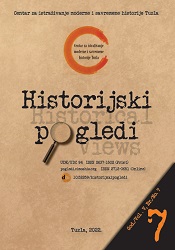Državna politika razdvajanja službenika Islamske zajednice u Bosni i Hercegovini (1945-1963)
State policy of separation of officials of Islamic communities in Bosnia and Herzegovina (1945-1963)
Author(s): Denis BećirovićSubject(s): Political history, Islam studies, Government/Political systems, Politics and religion, WW II and following years (1940 - 1949), Post-War period (1950 - 1989), History of Communism
Published by: Centar za istraživanje moderne i savremene historije Tuzla
Keywords: Islamic Community; Muslims; Federal People's Republic of Yugoslavia; Communist Party of Yugoslavia; League of Communists of Yugoslavia; Bosnia and Herzegovina; Religious Communities; Believers; State;
Summary/Abstract: The attitude of the new authorities in Yugoslavia (and Bosnia and Herzegovina) towards the officials of the Islamic Community in Bosnia and Herzegovina, from the end of the Second World War to 1963, especially the state policy of separating „reactionary" from „positive" officials of this community, seems to be of the most important segments far the overall understanding of communist policy towards religious communities. So far, we cannot boast of fundamental work on this issue, not only because the original archival material is scarce, but also because there was a lack of good will to explain this problem factually and comprehensively. The issue of separating the „positive " from the „ reactionary " officials of the Islamic Community in Bosnia and Herzegovina has been the subject of continuous attention of the federal and republican commissions for religious affairs', as well as other authorities that more or less participated in creating and implementing stale policy towards religious communities, including the Islamic Community. This paper contextualises the legal and political post-war circumstances in which the Islamic Community operated and analyses the manifestations and effects of the communist policy of establishing differentiation among the officials of this community. Religious rights and freedoms prescribed by the federal and republican constitutions did not simultaneously imply their concrete implementation in practice. The practical application of religious rights and freedoms on the ground largely depended on the will of party organisations and their political goals. In the category of those who should be disempowered, the communist government included the Islamic Community, which according to the ideological views of this government should have been economically weakened by a series of restrictive laws. That is why, in the first months after its liberation, AVNOJ's Yugoslavia began to speed up the adoption of legal regulations that limited the property and rights of religious communities, including the Islamic Community. The new government did not respect the specific elements of religious communities, treating them in exactly the same way as other landowners and private entrepreneurs. By 1963, the communist government had adopted a set of legal regulations on the basis of which the state proceeded to confiscate the property of the Islamic Community through legal mechanisms of confiscation, nationalisation, sequestration and expropriation. Along with the disempowerment measures, the measures to bring this community under control by the government were also applied. For this purpose, the policy of separating „ reactionary " .from „positive " officials of the Islamic Community was used, among other things. Numerous reports, analyses and letters from the Commission for Religious Affairs' pointed out that, unlike the leading representatives of the Islamic Community in the lower structures of this community, the readiness to cooperate with the authorities was not at such a level. Due to such assessments, the Commission considered that the officials of the Islamic Community on the ground were for the most part „ reactionary ", and that „ in a sense there is a danger of separating the top "from the lower officials of this community. Numerous materials from the Commission on Religious Affairs' from the 1950s and early 1960s stated that there were still „reactionary elements " within the Islamic Community who were opposed to the socialist social order. However, especially since the late 1950s, it has been pointed out that such individua/s are few and are unable to have any decisive influence on members of the Islamic community. Therefore, the governing structures in Bosnia and Herzegovina in the late 1950s stated that in general it can be concluded that the situation in the Islamic Community is „ very favourable ". In their opinion, the officials and the vast majority of officials are patriotic and willing to cooperate, as well as to accept all proposals that are in accordance with the Constitution and laws. The stale policy of awarding decorations was also in the function of supporting and affirming the „positive " officials of the Islamic Community in Bosnia and Herzegovina.
Journal: HISTORIJSKI POGLEDI
- Issue Year: V/2022
- Issue No: 7
- Page Range: 193-216
- Page Count: 24
- Language: Bosnian

